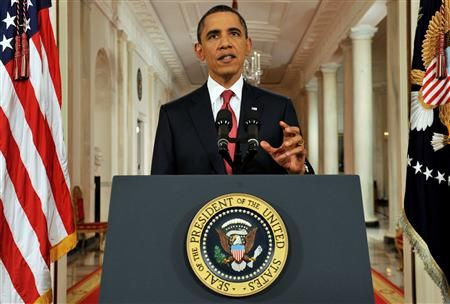Pending Debt Ceiling Vote, Obama urges compromise

With four days left before the United States hits its debt limit, Republicans pressed ahead with a deficit plan that cannot pass Congress and President Barack Obama told lawmakers to stop wasting time and find a way "out of this mess."
Republicans in the House of Representatives said they expected to vote on Friday on a retooled deficit-reduction measure that would raise the debt ceiling.
The bill is opposed by Democrats and the White House, but Republicans insist it clear the House before they will start talks toward a compromise measure.
Obama called the Republican bill a waste of time but said the parties were not that far apart on spending cuts and they needed to strike a deal soon.
"There are plenty of ways out of this mess but we are almost out of time," he said, warning that the country's top-notch triple-A credit was at risk.
The United States will be unable to borrow money to pay its bills if Congress does not raise the debt limit by August 2. That could result in an unprecedented default that could push the already fragile economy back into recession.
Fears about the health of America's economy multiplied after a government report showed weaker-than-expected growth from April through June, raising the risk of recession.
Republican leaders have rushed to revise their debt plan with changes that can win enough rebellious conservatives to pass the House of Representatives. That hurdle must be cleared before work on a compromise with Democrats is started in earnest, lawmakers and the White House say.
World leaders have been stunned by the dysfunction in Washington that has led the United States to the brink of default. World Bank President Robert Zoellick said on Friday that the United States was playing with fire.
America's largest foreign creditor, China, has repeatedly urged Washington to protect its dollar investments and its state-run news agency on Friday said the United States had been "kidnapped" by "dangerously irresponsible" politics.
PERILS FOR OBAMA
The debt standoff carries perils for Obama, who is already grappling with slumping approval ratings because of frustrations over the economy and a 9.2 percent unemployment rate.
His re-election prospects would be battered by a severe market downturn or a potentially historic downgrade of the U.S. credit rating, which would drive borrowing costs up for the government and consumers.
With time running out to avert default, Obama called on the American people to intervene directly by calling, emailing or posting messages on Twitter to their lawmakers. Within minutes, telephone circuits in the House were overwhelmed by a high volume of external calls, resulting in busy signals or difficulty getting through on phone lines, House aides said.
Financial markets were rattled and driven by headlines as traders and investors struggled to guess how debt talks would unfold. That drove many of them to hold cash rather than take any position in the market heading into the weekend.
U.S. stock prices dropped and the U.S. dollar plunged to all-time lows against the safe haven Swiss franc due to debt worries and poor economic growth.
The U.S. Treasury will unveil an emergency plan explaining how the government would function and pay its obligations if Congress does not agree to raise its borrowing limit beyond $14.3 trillion. Treasury's announcement will not come on Friday, but it is expected before Tuesday if there is no deal, according to a source familiar with the matter.
House Speaker John Boehner's failure on Thursday to quell a rebellion among conservatives in his party and bring his proposal to a vote exposed a rift in the Republican Party that complicates efforts to reach a compromise.
The revised Republican plan being considered on Friday includes tougher requirements on Congress to pass a balanced budget amendment to the Constitution and send it to the states for ratification, a long-time core demand of conservative Republicans who say it is the only way to control spending.
While the measure may pass the Republican-controlled House, it is expected to be rejected by the Democratic-led Senate.
At that point, efforts would shift to a compromise plan. For Boehner, that could mean drafting a deal that can win enough votes from Democrats in the House to offset the inevitable loss of support from Tea Party-affiliated Republicans.
© Copyright Thomson Reuters 2024. All rights reserved.





















